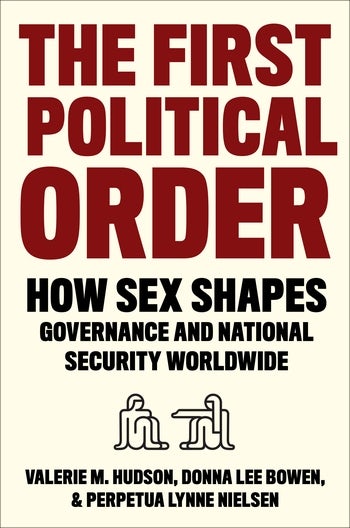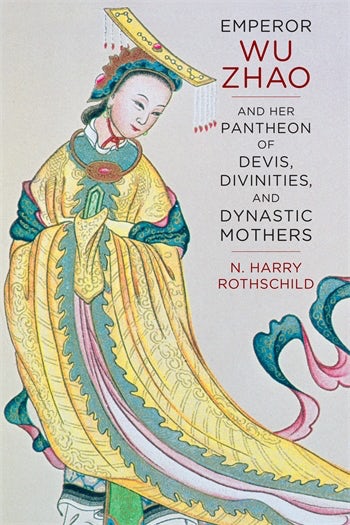The First Political Order and Its Effects on Governance and National, Human, and Environmental Security
By Valerie M. Hudson

“From now on, there will be no more separating questions of politics and peace from the treatment of the females. Those days are over. Thanks to Valerie Hudson and her team of global researchers, we have a long, practical, intimate way of diminishing violence and increasing democracy.”
~Gloria Steinem
In this Women’s History Month, post Valerie M. Hudson, co-author of The First Political Order: How Sex Shapes Governance and National Security Worldwide with Donna Lee Bowen and Perpetua Lynne Nielsen, draws on her research to discuss feminist foreign policy and the gravity of gender relations.
Make sure to enter our giveaway for a chance to win a copy of this work!
• • • • • •
Imagine a scenario in which the US Department of Defense pays for the most comprehensive empirical investigation of how the subordination of women degrades national security and stability. Far-fetched? It happened to my co-authors and me, and the result our new book, The First Political Order: How Sex Shapes Governance and National Security Worldwide. It clocks in at 606 pages, and makes a terrific doorstop.
But it’s far more than that. This research puts to rest the notion that the movement for a feminist foreign policy is some type of politically correct fluff. To the contrary, it turns out that the deep roots of many things that matter most to the peoples of the world—good governance, economic prosperity, a stable peace, health, demographic security, and environmental preservation—are to be found in the character of male/female relations within a human collective.
“This research puts to rest the notion that the movement for a feminist foreign policy is some type of politically correct fluff.”
While gender performance varies widely across cultures, what does not vary is that roughly half of the population of a given human collective has the potential to be mothers (and not fathers) and the other half to be fathers (and not mothers) and that children require the interaction of both a mother and a father to be brought into being and thus are all of “mixed” heritage. This sexual parameter of human life, we argue, sets the stage for the origin of all politics: it is the first political order of all human societies. Add to these foundational sexual facts the differential upper-body strength between men and women (termed “human sexual dimorphism”), differential bodily and time investment in reproduction, and readily observable anatomical differences and the political game is already afoot. Men and women are the originary “Others” for each other, and the politics between them will profoundly influence the socialization of the children born to them—and the larger society that forms as a result.
I often help my students see the political nature of male/female relations by imagining they are a video game designer. The only parameters given are that there are two equal-sized groups in the game, and unless they work together, the game is over after one round. My students invariably tell me this is not enough information: they ask to know if these two groups engage each other as equals, or as superior and inferior? Are decisions for the group made by one group or both groups? If the two groups disagree, how is that disagreement resolved—by consensus or by force? Are resources distributed equally among the two groups?
“Men and women are the originary ‘Others’ for each other, and the politics between them will profoundly influence the socialization of the children born to them—and the larger society that forms as a result.”
Exactly, I respond. Depending how these questions are answered, you will get vastly different games. Consider what type of society is formed when one group, let’s call it A, is superordinate over the other (B) and makes all important decisions for the collective. The second group, B, may be ignored or punished if it protests this arrangement. A strives to monopolize and control all resources necessary for survival and persistence, including land, wealth, and children. B can be coerced into providing what the first group needs through physical violence until acquiescence is obtained. B becomes, in essence, another resource controlled by A, a resource from which rents, such as productive and reproductive labor, are extracted by coercion and subordination.
If that were the structure of male–female relations—if this was the sexual political order established—how would that shape the development of the collective’s societal political order? We argue that, in this case, the groundwork will have been laid for an inequitable political order ruled by monopolistic rent seekers prepared to ensure the continued flow of their rents through exploitation, corruption, and violence. Worse yet, such societal arrangements would seem “natural and right” given the original choices made with regard to the First Other—that is, the first B—woman. An unsurprising consequence is that all “others” in the society—those of different ethnicity, religion, and ideology—thus also tend to be relegated to the same lower status accorded to females. In a sense, these others are “feminized” because their status, agency, and so forth correspond more to that of women in society than to that of men. The nature of the first, that is, sexual political order may work to normalize inequity, violence, authoritarianism, and a parasitical and monopolistic rent-based economy within the broader societal political order.
“The nature of the first, that is, sexual political order may work to normalize inequity, violence, authoritarianism, and a parasitical and monopolistic rent-based economy within the broader societal political order.”
In our book, we propose a theoretical framework suggesting that a sexual political order exists that crosses space and time in its manifestation—an order that is focused on building fraternity through the systematic subordination of women and that often uses patrilineality to facilitate the creation of that fraternity. We refer to this order in terms of what we argue is an interlocking pattern of institutions, processes, and norms that enforce it. More specifically, we refer to this interlocking system as the Patrilineal/Fraternal Syndrome. We argue that the instantiation of this Syndrome through specific and nearly universal enforcement practices has profound direct and indirect effects on a society’s levels of stability, resilience, and security, mediated by the type of societal political order that emerges from this first sexual political order. We conceptualize this Syndrome system as an ouroboros, comprised of the interlocking subordinative mechanisms such as high levels of violence against women, low age of marriage for girls, lack of property and inheritance rights for females, patrilocal marriage, polygyny, brideprice, cousin marriage, and so forth.
The fraternity formed by means of these practices, the extended male kin network, is justified as a way to provide physical security for the group. However, it is our contention that reliance on extended male kin groups for security always produces a dysfunctional, corrupt, violent destiny for any society. The primary reason it does so is due to the character and structure of the first sexual political order. When that first order, encompassing as it does the two halves of the human race, is predicated on violence, predation, oppression, coercion, and exploitation experienced by one half at the hand of the other half (to which it has given birth, ironically enough), the die is cast. It would take an extraordinary assault on the components of that subordinative first political order for society to escape its fate.
Is there any empirical evidence for this argument? The support of the Minerva Initiative of the US Department of Defense allowed us to gather an unprecedented dataset on the Syndrome’s practices worldwide today. While the short space allotted this summary does not allow us to present all of the qualitative evidence we gathered, which is copious, we can report the results of our statistical analysis. Examining approximately 176 nations, we examined whether national outcomes such as conflict, terrorism, poverty, and so forth, were significantly associated with a subordinative first political order, while controlling for background factors such as level of urbanization, levels of ethnic fractionalization, colonial history, and so forth. Holding these characteristics constant, is that subordinative order strongly related to national outcomes? In all we examined 122 national outcome measures related to conflict, stability, governance, prosperity, health, demographics, education, environmental preservation, and social progress.
Across all 122 outcome variables, the subordination of women was both significant and the explanatory factor with the largest or second largest effect size over 70% of the time.
Alternatively, consider the odds. If your nation highly encodes the Syndrome, then it has
2.13 times the chance of being a fragile state
3.53 times the chance of having a government that is more autocratic, less effective, and more corrupt
1.5 the chance of being unstable and violent
1.28 times the chance of experiencing terrorism
1.40 times the chance of the country being poor and in economic decline
1.50 the chance of having a low GDP per capita
1.55 times the chance of having low environmental quality
1.92 times the chance of having a high fertility rate
1.83 times the chance of a higher incidence of preventable deaths
1.80 times the chance of scoring worse on the Global Hunger Index
It’s almost as if a human collective that chooses inequality between men and women as its first political order has literally cursed itself. At least that is what the data unequivocally show.
What are the policy ramifications of this new understanding of the first political order for foreign/security policy? Not surprisingly, we argue that it justifies the Women, Peace, and Security agenda and the development of a feminist foreign policy: our specific policy recommendations can be found in the concluding chapters of the volume. But in the meantime, it is no overstatement to suggest that a feminist foreign policy might actually be more realist than much of what passes for Realpolitik in international affairs today. Remember that the primary claim to authority by realism is that it purports to acknowledge the world as it really is—which means that acknowledging that sex profoundly shapes governance and national security worldwide is therefore a deeply realist turn for scholars and policymakers alike.
Valerie M. Hudson is the co-author of this month’s Emma Watson book club selection, Sex and World Peace, and, co-author of The Hillary Doctrine: Sex and American Foreign Policy.







